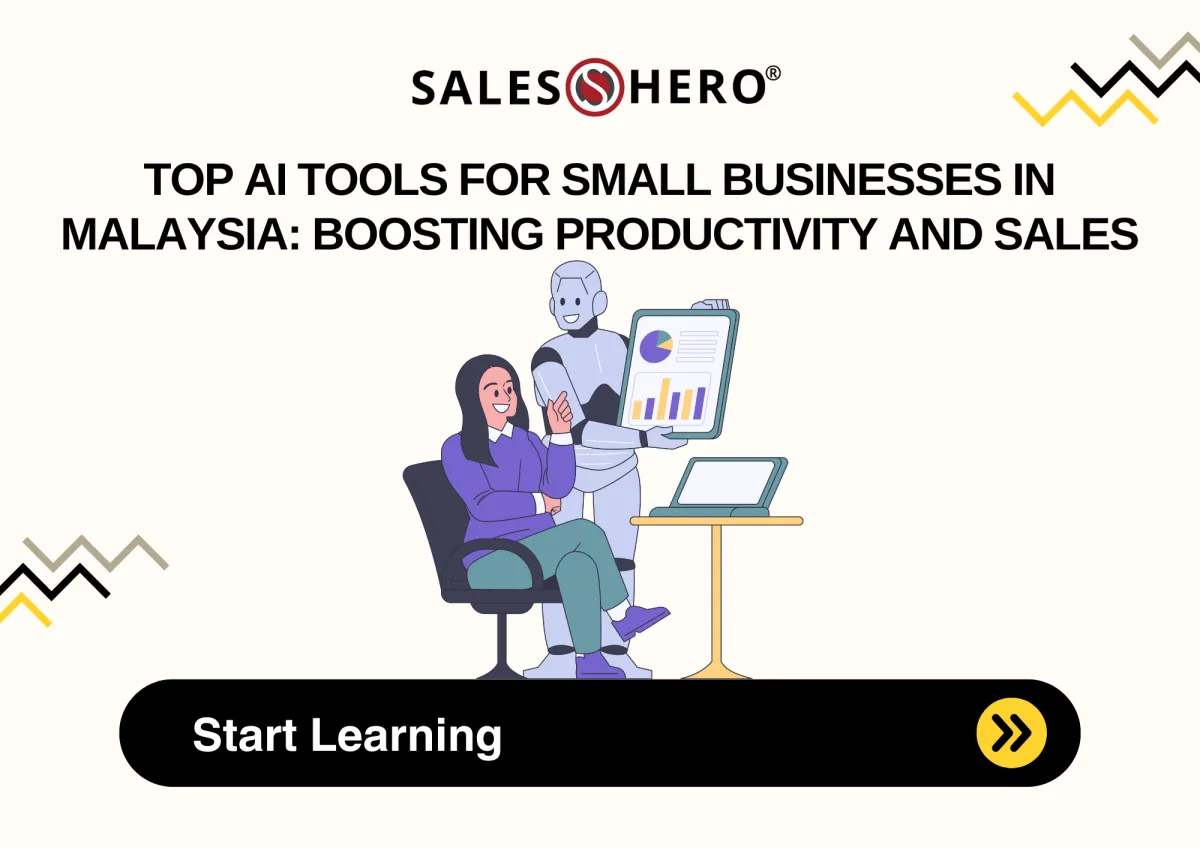
Author: Christopher Yip
Date Published: 8 May 2025
Top AI Tools for Small Businesses in Malaysia: Boosting Productivity and Sales
In recent years, many local businesses have had to go digital to survive global shocks. Now, advanced technologies like artificial intelligence (AI) are opening new opportunities: automating routine tasks, personalizing marketing, improving customer support, and streamlining operations. The government is also pushing AI adoption via grants and programs, helping Malaysia climb to 44th in the global AI Index (2023). Still, many SMEs cite budget and skills gaps as hurdles to using AI. This guide highlights top AI tools – both global solutions and Malaysia-specific platforms to help Malaysian small businesses boost productivity and sales.
Table of contents
1. General AI Tools for SMEs
2. Malaysia-Specific AI and Tech Solutions
3. Use Cases by Function
4. Conclusion
5. FAQs
General AI Tools for SMEs
ChatGPT (OpenAI) – A versatile AI chatbot that can write content, answer questions, brainstorm ideas, and even draft emails or code. It supports English (and Malay) queries, making it useful for marketing copy, blog posts, customer messages, and more. For example, small e-commerce sellers use ChatGPT to generate product descriptions and FAQs quickly, while consultants rely on it for research summaries.
• Use in Marketing: Create ad copy, social media posts or SEO-friendly articles in minutes.
• Use in Customer Support: Use it as a virtual assistant to draft email replies or support scripts.
• Use in Operations: Ask it to generate checklists, training materials, or business plans.
Notion AI – An AI assistant built into the Notion workspace (a popular note-taking and project-management tool). Notion AI can summarize documents, brainstorm ideas, improve writing, and generate text or to-do lists right inside your company knowledge base. For instance, a retailer could use it to summarize weekly sales reports or draft promotional plans. In practice, Malaysian SMEs use Notion AI to organize meeting notes, draft SOPs, or translate content between English and Malay.
Jasper AI – A content-generation platform aimed at marketing teams. Jasper’s AI can write blog posts, social media ads, product descriptions, email campaigns, and more, adapting to your brand’s tone. Unlike general chatbots, Jasper provides templates for marketing tasks (e.g. “Facebook ad copy”, “blog intro”, “email subject lines”). This can save SMEs hours on content creation and brainstorming.
Beyond these, there are many specialized AI products that SMEs can explore. For example, Google Bard or Microsoft’s Copilot can assist with writing or data analysis; Canva’s AI features help design graphics and logos; and AI-powered SEO tools (like Surfer SEO) optimize website content. The key is choosing tools that match your needs (content creation, customer engagement, analytics, etc.) and budget. Always look for trial versions and user-friendly interfaces, since many founders emphasize accessibility over advanced AI knowledge.
Malaysia-Specific AI and Tech Solutions
Besides global tools, several Malaysia-based platforms use advanced tech (including AI) to help local SMEs. These homegrown solutions are often tailored to Malaysian business contexts:
StoreHub (POS & Management): A Malaysian all-in-one point-of-sale system for retail and F&B businesses. StoreHub lets shop owners ring up sales, manage inventory, track customers, and run promotions from one dashboard. For example, a café can use StoreHub to automatically update stock levels as drinks are sold, and even send SMS promotions to loyal customers. StoreHub also integrates online and offline sales, so you can manage a physical store and webstore together.
Lapasar (Wholesale Marketplace): A B2B platform serving restaurants, groceries, and other retailers. Lapasar digitizes supply procurement: instead of sourcing dozens of suppliers individually, a small cafe can order ingredients and kitchen supplies all in one place. Lapasar handles warehousing and delivery too. It’s especially useful during shortages: users can get bulk items quickly via Lapasar’s network. The platform has already served over 10,000 Malaysian SMEs.
iPay88 (Payment Gateway): Malaysia’s popular online payment processor. If your business sells online (or in-app), iPay88 lets you accept credit cards, debit cards, online banking (FPX), and e-wallets (like GrabPay). It also supports multi-currency, which helps SMEs sell regionally. iPay88’s system uses machine learning for fraud detection (flagging unusual transactions) and 3D Secure technology for card payments, making it secure for Malaysian businesses.
SalesAi (Whatsapp AI Chatbot): A local AI tool designed specifically for Malaysian SMEs. Able to response 24/7 with multilingual like Chinese, Bahasa Melayu and English.
There are also AI-powered solutions like Infobip (AI-driven chatbots and messaging), and local startups such as Supahands (offers human+AI data tasks). The Malaysia Digital Economy Corporation (MDEC) and tech hubs are launching AI initiatives tailored to Malaysian languages and needs, so keep an eye on new local AI tools (for example, translation or voice bots in Bahasa Melayu) as they emerge.
Ready to supercharge your WhatsApp presence?
Discover SalesHeroAI and launch your chatbot in minutes!
Use Cases by Function
Below we detail how the tools above can be put into practice in specific business areas. The goal is to show concrete examples of what Malaysian SMEs can do today with AI.
Marketing and Sales
• Content generation and personalization. Tools like ChatGPT and Jasper can generate marketing content at scale. For example, a café owner might ask ChatGPT to draft a weekly Instagram post promoting a new dessert. The AI can include local flavor (mention “durian” or “teh tarik” if prompted). Jasper could be used to create variations of an email newsletter in seconds. Using these tools, a small marketing team can produce content 2–5× faster, freeing up time for strategy.
• Advertising and targeting. AI can analyze customer data to target ads better. For instance, ChatGPT or Jasper can help write ad copy that resonates with different customer segments (families vs. students). Facebook and Google also offer AI-driven ad optimizers. A practical approach: feed these platforms your objective (e.g. “drive online orders”) and let them use machine learning to show ads at the right time. According to industry research, personalized email campaigns see up to 200% higher click-through rates and 15% greater order value than generic mailings. You can achieve this by combining CRM lists (from StoreHub or another tool) with AI-generated email content.
• Social media and chat promotion. Chatbots like SalesAi can join marketing too. The bot can automatically follow up on inquiries with special offers. For example, if a customer asks about product availability, SalesAi might respond and add, “By the way, we have 10% off all items until tomorrow midnight.” These micro-conversions help smaller businesses emulate the personalized upsells of big retailers.
Customer Service and Support
• AI chatbots (SalesAI, ChatGPT agents). The biggest leap is automating common customer queries. SalesAI lets you create a WhatsApp chatbot that answers FAQs instantly: “Is this item in stock?”, “How do I return?”, “When will my order arrive?”. This is extremely popular in Malaysia because 30+ million people use WhatsApp. Instead of hiring a full-time receptionist, an SME can have a SalesAI bot handle basic support 24/7, with human backup for unusual issues. Shopee’s experience shows the power: their AI assistant “Sophie” handled 18 million chats in 2023, resolving about 80% of inquiries on its own.
• Multichannel support. ChatGPT and similar bots can also be embedded on websites or integrated via APIs (using services like Twilio). For example, a restaurant website could have a ChatGPT-driven widget that answers customer questions. Even if not available 24/7, ChatGPT can be used during business hours to draft quick replies. A multilingual ChatGPT can handle queries in Malay or Chinese on the same platform.
• Ticket automation and voice assistants. Some SMEs use AI to manage email and ticket workflows. For example, AI can categorize incoming support emails, prioritize urgent issues, or draft responses. Notion AI or ChatGPT can even analyze customer feedback data (from reviews or survey responses) to find common pain points.
• Human augmentation. It’s important to stress that AI augments human support, not replaces it. According to experts, AI handles repetitive questions so the human team can focus on complex or creative tasks. For instance, once the bot answers the standard tracking or stock queries, your staff can spend time building customer relationships or improving products.
Operations and Productivity
Content and planning automation. Notion AI, as mentioned, is great for internal use. SMEs can use it for meeting notes, project plans and task lists. For example, after a morning huddle, someone could paste the raw notes into Notion and ask “Create action items from this text.” Notion AI generates to-dos and assigns owners. ChatGPT can also summarize lengthy supplier emails or draft purchase order confirmations. These tasks (which used to be manual) become near-instant with AI.
Inventory forecasting and reorder automation. AI can analyze sales history to suggest reordering quantities. StoreHub’s inventory module, for example, automatically flags low-stock items. In more advanced setups, generative AI models could be trained on past sales and seasonality to forecast demand. While many of these features are built into advanced ERP systems, Malaysian retailers often rely on simpler tools like StoreHub. Nevertheless, StoreHub’s analytics (e.g. “best-selling products” reports) help owners make informed restocking decisions.
Financial operations. Beyond iPay88’s fraud-detection, AI can help with bookkeeping. Tools like chatbots can reconcile bank feeds or generate draft invoices from order data. For instance, a small wholesaler might use a ChatGPT prompt: “Summarize the last month’s sales from this exported spreadsheet,” turning raw data into a readable summary. (Though still emerging, such AI-driven accounting helpers can cut clerical work.)
Workflow integration. With SaaS platforms, many business processes can be automated. For example, chat platforms with bots can connect to your systems so that every new lead captured on WhatsApp is recorded in your sales pipeline automatically. This integration of AI chat with back-end tools streamlines the workflow: no more manual copy-paste of customer info.
Wholesale and Supply Chain (B2B)
Digital procurement. Platforms like Lapasar act as AI-enabled marketplaces. A grocery store can use Lapasar to automatically reorder supplies. The platform may recommend order quantities based on past purchases or popular items among similar stores. Lapasar’s approach – effectively using technology as the main reordering method – is already praised by industry leaders.
B2B sales automation. If your business is a wholesaler or distributor, there are B2B-focused AI tools too. For example, SalesHero (the company behind SalesAI) offers apps for field sales reps. A rep visiting a retailer can use the SalesHero app on their phone to generate quotes or orders on-site (see Sales Order or Quotation modules). AI features like auto-filling customer info or suggesting products streamline the order process. In effect, it turns a smartphone into a smart sales assistant.
Dynamic pricing and recommendations. In bigger e-commerce marketplaces (like Lazada, Shopee), AI constantly adjusts prices and recommendations. Malaysian retailers selling online indirectly benefit from this when consumers see more targeted deals. An SME could analyze those strategies: for instance, if Shopee’s algorithms boost certain products during holiday seasons, a retailer might mimic that by creating seasonal bundles. Even without coding it themselves, business owners can use ChatGPT to simulate dynamic pricing scenarios or ask for bundling ideas.
Conclusion
AI tools are no longer science fiction for Malaysian small businesses – they’re practical aids you can start using today. Global platforms like ChatGPT, Jasper and Notion AI provide instant, on-demand intelligence for tasks like content writing, brainstorming and summarizing. At the same time, Malaysia-specific solutions like SalesAI, StoreHub and Lapasar ensure this intelligence fits local languages, payment methods and market conditions.
By adopting these tools in marketing, operations, customer service and procurement, SMEs can significantly boost efficiency and sales. Integrating a smart POS like StoreHub or a wholesale platform like Lapasar means less manual paperwork and fewer missed opportunities. Importantly, getting started is easy. Many tools have free tiers or trials (e.g. ChatGPT, StoreHub demo, SalesAI free trial. Small businesses should begin with one use case – say, using ChatGPT for one marketing campaign or deploying a WhatsApp FAQ bot – then expand from there. As one analyst puts it, AI for SMEs is not about replacing people but enhancing productivity. By automating routine tasks, you free up your team to focus on creativity, customer relationships and strategic growth.
FAQs
Will using AI cost me jobs or hurt my employees?
Not at all. The goal of AI in a small business is to take over repetitive, time-consuming tasks, not core creative or human ones.
What if the AI gives wrong or inappropriate answers?
This is a valid concern. Tools like ChatGPT can sometimes make mistakes or provide incomplete info. The best practice is to monitor AI outputs, especially early on. For customer-facing bots, test all responses thoroughly. Keep a human-in-the-loop for critical tasks initially.
How can I start adopting AI tools in my business?
Begin with one simple use case .Many platforms (ChatGPT, StoreHub, SalesAi, etc.) offer step-by-step guides and customer support. Also look for local training – some tech agencies in Malaysia offer workshops on AI tools for SMEs. The key is to start small, measure results, then expand: if an AI tool saves you hours on one task, you’ll quickly see its value and want to apply it to others.





